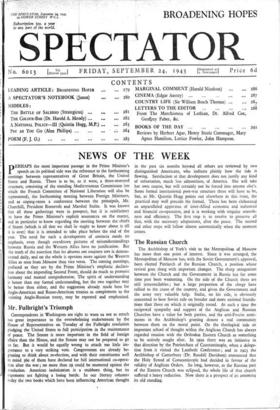Mr. Fulbright's Triumph
Correspondents in Washington are right to warn us not to attach too great importance to the overwhelming endorsement by the House of Representatives on Tuesday of the Fulbright resolution pledging the United States to full participation in the maintenance of peace. The Senate is more important in the field of foreign affairs- than the House, and the Senate may not be prepared to go so far. But it would be equally wrong to attach too little im- portance to a very striking vote. Congressmen are already be- ginning to think about re-election, and with their constituents well in mind 36o of them have declared for full international co-opera- tion after the war ; no more than 29 could -be mustered against the resolution. American isolationism is a stubborn thing, but its exponents are fighting a losing battle. In our literary columns today the two books which have been influencing American thought in the past six months beyond all others are reviewed by two distinguished Americans, who indicate plainly how the tide is flowing. Satisfaction at that development does not justify any kind of exhortation, much less admonition, of America. She will take her own course, but will certainly not be forced into anyone else's. Some formal international post-war structure there will have to be, but, as Mr. Quintin Hogg points out elsewhere in this issue, the practical may well precede the formal. There has been elaborated an unparalleled apparatus of inter-Allied economic and industrial and financial co-operation, and it is working with singular smooth- ness and efficiency. The first step is to resolve to preserve all that, with the necessary adaptations, after the peace. The second and other steps will follow almost automatically when the moment comes.


























